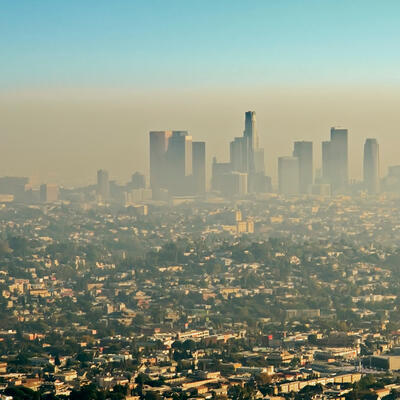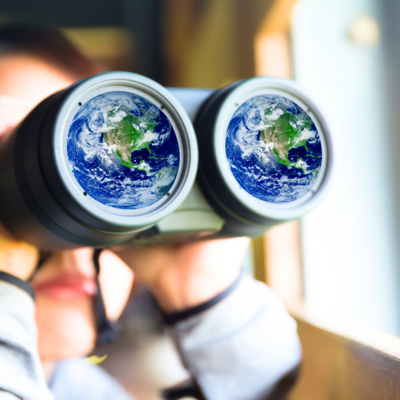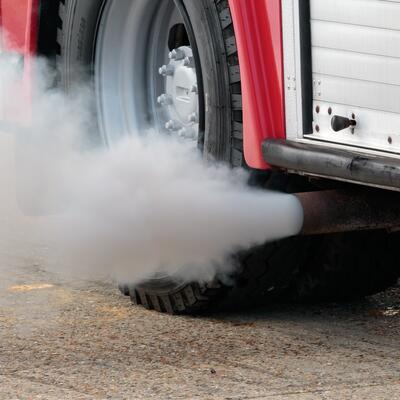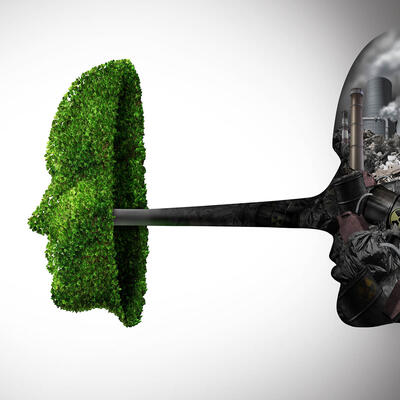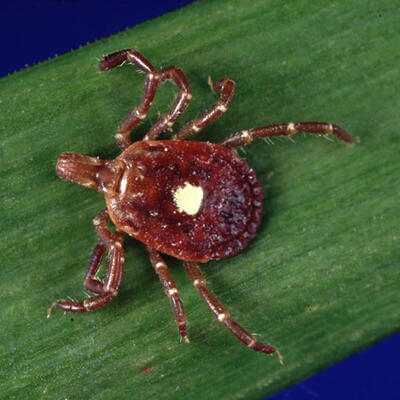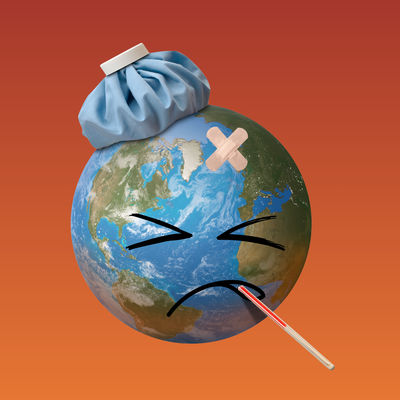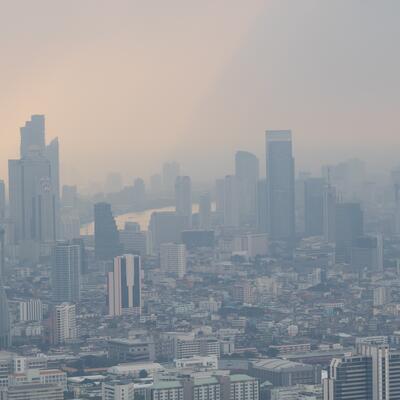
Cause of Death: Air Pollution
Guests
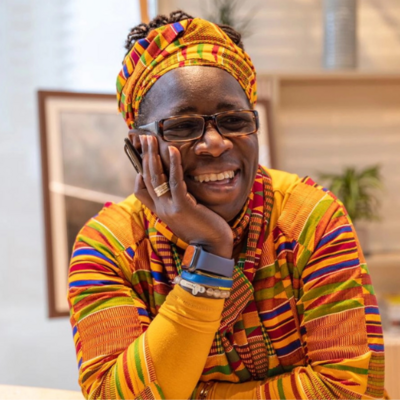
Rosamund Adoo-Kissi-Debrah
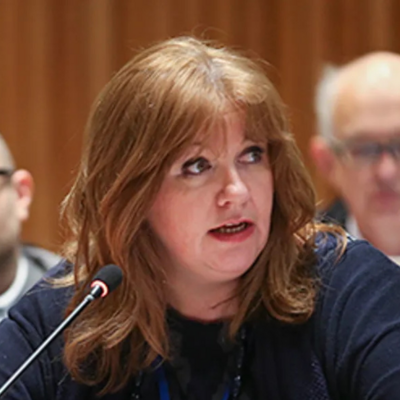
Sheila Watson
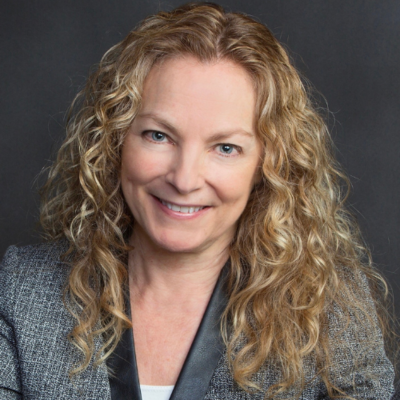
Susan Joy Hassol
Summary
Pollutants from burning fossil fuels — from smokestacks, tailpipes, gas flares and more – are warming our world and poisoning our air.
“99% of the world's population live in places where the World Health Organization’s air quality guidelines are not being met. So that's basically all of us,” says Sheila Watson, deputy director of the FIA Foundation.
Air pollution from burning fossil fuels contributes to millions of premature deaths every year, and a large proportion of them come from transportation. Like climate-disrupting emissions, air pollution can be hard to visualize until the impacts become very apparent.
Watson’s organization recently sponsored a study on the health benefits of better policies targeting road transport emissions. By implementing policies like switching to electric cars, paying to remove the dirtiest vehicles from the roads and congestion pricing, “The report suggests as many as 1.9 million premature deaths could be averted,” as well as preventing more than 1.4 million new cases of pediatric asthma over 17 years.
So reducing our use of fossil fuels wouldn't just make for a healthier climate, it would save millions of lives around the world. Because air pollution can be deadly.
Rosamund Adoo-Kissi-Debrah lost her daughter, Ella Roberta, to a severe asthma attack in 2013. Ella was only nine years old.
“If it wasn’t for the pollution near where we lived, not only would Ella not have got asthma at all, she wouldn't have died on that fatal night because on the night she died, it was at its highest.”
Adoo-Kissi-Debrah spent seven years advocating for the designation of “air pollution” as a cause of death on her daughter’s death certificate. She’s become a powerful advocate for policies to clean up the air and improve public health.
“I think governments need to become clean,” she says. “I've now found that the fossil fuel lobby wants to keep this thing going. It's not sustainable. People are now suffering. So I ask all governments, look at the amount of money you are spending on your healthcare and [use] a fraction of that to clean up.”
Addressing the causes of air pollution would also go a long way to addressing climate disruption. In light of how polarized the climate conversation has become, should we then shift to talking about protecting our air? Susan Joy Hassol of Climate Communication believes we’re using the wrong words to advocate for climate policies. We should reframe the discussion, she says, to be one that’s “not about polar bears, not about saving the planet. It's about saving ourselves and everything we love and care about.”
Episode Highlights
03:00 – Rosamund shares details of Ella’s young life and her early asthma attacks
08:00 – Ella becomes first person to have “air pollution” listed as cause of death
13:00 – Rosamund’s work sharing Ella’s story and raising awareness about air pollution
20:30 – How poisonous transportation emissions are and policy tools to reduce them
26:00 – Economic development does not need to sit contrary to healthy air
27:00 – Dieselgate and the work of the True Real Urban Emissions initiative
31:00 – Extreme heat can make air pollution more deadly
37:00 – Why we shouldn’t use the term "climate change”
43:00 – Finding ways to connect with people on climate based on their priorities
49:00 – How to convey the seriousness of climate threats while also empowering people to feel that they can make a difference
52:30 – Climate One More Thing
Resources From This Episode (5)
Full Transcript
Note: Transcripts are generated using a combination of automated software and human transcribers and may contain errors. Please check the actual audio before quoting it.
Ariana Brocious: I’m Ariana Brocious.
Kousha Navidar: I’m Kousha Navidar.
Ariana Brocious: And this is Climate One.
[music change]
Kousha Navidar: Ariana, could we start by taking a deep breath?
Ariana Brocious: Sure.
[deep breath]
Kousha Navidar: Feels good.
Ariana Brocious: Yeah, it feels so good when you stop to think about it.
Kousha Navidar: And what we’re really talking about today is breathing. A lot of us do it without really thinking about what might be in the air we pull into our lungs. It’s kind of like climate – we may not think about it much until something significant happens, like a flood or wildfire.
Ariana Brocious: Yeah, I see where you’re going with this: Both air pollution and climate disrupting emissions can be hard to visualize until the impacts become realy apparent.
Kousha Navidar: Exactly. Today, we’re going to be talking about the connection between air pollution and human-caused climate disruption. I think it’s an important connection to make. Air pollution from burning fossil fuels causes millions of premature deaths every year. So reducing the amount of fossil fuel use wouldn’t just make for a healthier climate, it would save millions of lives around the world.
Ariana Brocious: It’s also important to talk about air pollution because talking about climate disruption has become so politically fraught. But I think pretty much everyone can agree that air pollution is something we should try to prevent. I mean we all want clean air.
Kousha Navidar: I know. I’ve been training for the New York marathon (I know that’s a weird flex but thanks for indulging me). I bring it up because lately, including today, I’ve had to move my training runs inside to a treadmill, because the air quality hasn’t been great because of wildfires in Canada. I can feel it in my lungs if I run in bad air.
Ariana Brocious: And you’re a young guy. A lot of people, especially older adults and young kids are even more vulnerable to bad air. A couple years ago my 5-year old spent a week in the hospital for what turned out to be asthma and other respiratory distress, and it was an incredibly scary experience. So I’ve become much more attuned to my local air quality.
Kousha Navidar: I can’t imagine how difficult that must have been. Our first guest also had that experience. And unfortunately it continued to get worse. Rosamund Adoo-Kissi-Debrah lost her daughter, Ella Roberta, to a severe asthma attack in 2013. Ella was only nine years old.
Rosamund Adoo-Kissi-Debrah: I never tire of talking about her and I feel it's a privilege for me to talk to your listeners in America. The reason why I say that is not because she's no longer here in in her short lifetime. She died when she was nine. I only told her off once, like severely because she had stolen someone's soccer cards.
'cause Ella was obsessed with soccer. But generally, the reason why I bring this up is. I sometimes have to remind myself, was she that good? And the answer is yes, she was. She was a big sports fan, so she was always on wheels of cycling, skateboarding, roller skating. She was a dancer. And she did a bit of acting, singing, but I'm not gonna lie, the voice wasn't great. Ella, Ella could play. No, no, no. See, I don't glamorize that. Ella could play before she died at nine about 12 instruments. So she knew her, her stuff.
Kousha Navidar: Can you take me back to the day when you realized there was a problem?
Rosamund Adoo-Kissi-Debrah: Well, I wasn't sure at first. So the symptoms looked like her having a cold, a severe cold. So here, took her to the doctors, got her some antibiotics, but then she developed this cough, and the cough didn't go away. They gave her stronger antibiotics, but the second time they were like, let us refer you to, to the hospital. By the way, up until this point, she had never been to a hospital with her breathing. You need to remember.
Kousha Navidar: And, and she was like seven at the time?
Rosamund Adoo-Kissi-Debrah: She was six years and, and nine months. So she, this was October and she turned seven in January. And when you look at her record up until that point. The previous year, there was one where she had a virus, but she, she was a child. No one's gonna be worried about one virus in one year. So there was nothing that pointed out what was about to happen. So the cough wasn't great. But also she gave it a blue inhaler to help when she was coughing. Still I'm pretty hardcore 'cause I teach in the school. Maybe high school, you call it. My students are 14, 15, 16. So I'm not about to sweat when my daughter has got a cough.
Kousha Navidar: But it, it, it started getting worse from there, right? Like what, what was, what was her life like from then on in her last couple of years?
Rosamund Adoo-Kissi-Debrah: Well, when I now think about it, because you, you, you, you can now look back. She was never a hundred percent the same. She wasn't always having coughing and hypoxic seizures. Hypoxic seizures are to do with lack of oxygen, not all the time. So during the Olympic games, for some reason she was fine. And also she began to learn when these attacks were gonna come on. When it first started, even she wasn't aware of it. So it must have taken her by surprise. But as time goes on, sometimes she'll start coughing. She could probably see the panic in my eyes and she would wave a finger that, no, I'm fine. I might be coughing, but whereas if she was coughing, then she clang onto me, then I thought, wow, we are in trouble here.
Kousha Navidar: Tell me about your side of it too then. What was your life like in those years?
Rosamund Adoo-Kissi-Debrah: Horrendous. I'm not gonna lie. Horrendous. I don't think I will ever truly recover, and there's a very good reason for that because they had to eventually train me in the hospital because if she collapsed, you're not gonna have an ambulance on your doorstep within two, three minutes. That's not how these things work. So I had to learn to resuscitate her. And at least for her to be breathing, I am never going to get over it. Number one, I'm not gonna get over her dying. And also the manner she died as well. And I still feel that thing whereby I wanted to save her. But now that I'm talking to you, 12 years on, it was gonna be impossible. How many times can you resuscitate someone, let alone a child? I can now look back and see things, but when you are in the middle of it and you've never dealt with anything like that. and you have to be strong for your child as well. So even if I was panicking and when people flatline, the last thing that goes is the, is the hearing. When I figured that out, it was to remain as calm as possible, because I think her first one, when it happened, obviously I was shocked. She went blue and I thought she died and I was screaming. Then when she came around, she went, why were you screaming? And I was like, you could hear me? She was like, yeah, of course I could hear you. So from that moment on, it didn't matter how I was feeling. I was gonna remain calm. What you don't want when you're a child and you're struggling to breathe and you are, you think you're dying. You don't need your mother as well, screaming around seriously, that that's not cool. But it was a lot to hold in. But for her sake, and it, it, this was always about her. I mean, I was her mother, but I wasn't going through it.
Kousha Navidar: Well, you were going through sharing it and providing –
Rosamund Adoo-Kissi-Debrah: A different kind of emotion.
Kousha Navidar: – providing the love that you could.
Rosamund Adoo-Kissi-Debrah: Well, one of the things, when she always came around, I was always the first person she would call, so that was also the medics would say, okay, she's coming back now. When she would say the word mom.
Kousha Navidar: So let, let's, let's go to a, a difficult part of the story, but also the, the aftermath of it. So in 2013, your daughter, Ella Roberta, died from a severe asthma attack. She was nine. Ella's story led to a historic legal precedent when she became the first person globally to have air pollution listed as a cause of death on her death certificate.
Rosamund Adoo-Kissi-Debrah: Let me explain that. So when she became ill, I was a teacher and you knew either a child was born with something or, but how she was so ill, I was always a bit like, this is really strange 'cause she hadn't previously been ill up until these things happened.
Kousha Navidar: She was singing to Justin Timberlake and learning all the instruments. Yeah.
Rosamund Adoo-Kissi-Debrah: Yeah. All, all that kind of stuff. So I remember at the Child Death Review, I begged them to leave the case open. I wasn't sure how, because actually in court it was the only time 'cause the doctors never knew really what was wrong with her. But in court the first time round, they thought Ella's, those horrendous hypoxic seizures had something to do with the air. Now we can sit here now and go air pollution, but if someone says, oh, your seizures are to do with something in the air. They might as well not tell you anything because what is something in the air? And the doctors were a bit like, we don't want you to go down this rabbit hole again. You've been through enough.
Kousha Navidar: You know it, it took you seven years to get the system –
Rosamund Adoo-Kissi-Debrah: It did.
Kousha Navidar: designation of air pollution as a cause. Why was it so important to you to get the system to recognize that?
Rosamund Adoo-Kissi-Debrah: Well, we had to find out, and I have to give credit to her lawyer who found out that every time she was having these coughing seizures was when there was a spike in air pollution. That was her lawyer that worked that out. Wow. That was, I have to give her credit. She, so she went to hospital about 28 to 30 times and there was a correlation. There was only one episode that had nothing to do with the high air pollution, but I knew, 'cause what we'd been through, that wasn't going to be enough. Now, luckily for me, when I'd gone up to see the coroner's officer, I dunno whether I was watching too many XFiles at the time or not, but I got her to take samples from Ella's body, so they were there. So when our experts came in, I realized that 28 out of the 29 times, there was a spike in air pollution. But I knew I wanted a bit more than that because we'd been for this test and that. So he went to speak to the senior pathologist who examined her when she died and it was underneath the microscope. That's when they saw the PM 2.5 and PM one in her body.
Kousha Navidar: So that that led to the coroner ruling that quote, air pollution was a significant contributory factor to both the induction and exacerbation of her asthma. Let me ask you, how did you feel when you received that ruling?
Rosamund Adoo-Kissi-Debrah: Well, it was devastating. This is what he said, quote unquote, if it wasn't for the pollution near where, where we lived. This is what he said in court, not only would Ella not have got asthma at all. She wouldn't have died on that fatal night because on the night she died, then it was at its highest. So he was very, very clear. Without the pollution, she would not have even got asthma in the first place. But I think the other thing I was shocked at is something that I thought, oh, this was just my daughter. Not when I was reading those studies, no. It told me this was everywhere, and I think that I'm still quite shocked. But look, the reason why I'm shocked today in 2025, on the 19th of June, the same expert witness again has continued to do research and he now says there are 500 people dying every week prematurely. One of the things I need to make clear: In the area where we live, there's a lot of children with asthma, and it's higher than the national average. So if it wasn't Ella, it was always gonna be someone else.
Kousha Navidar: Of course.
Rosamund Adoo-Kissi-Debrah: We're still in exactly the same house that my daughter lived in, and there are many reasons for that actually. And kind people have asked us over the years, why don't you move? And you know, firstly, the roads which we live on is very small, so we know there's about maybe 10 houses. So we know everyone, and I think, yeah, se can get a house somewhere else, but it's never gonna have the memories that we have with my late daughter here. And I think also it was really tricky because when she first passed away, the community really supported my twins who were only five at the time. So yeah, to move away will be huge. So one of the things I always say to people is, we shouldn't have to move. They should sort out the traffic really.
Kousha Navidar: What do you hope your experience might mean for other families facing similar pollution impacts?
Rosamund Adoo-Kissi-Debrah: We have managed to raise awareness. A lot more people due to Ella dying, know about this. There's even a statue in our local park. There's a statue of her. But air pollution now is linked to 700 illnesses, diseases. It literally impacts every organ in our body, the most vulnerable as we've discussed our children, and the elderly. And I think. I take my time to explain to people. The reason is we breathe 11,000 liters of air every day, children 14,000 liters. And if you think we are breathing in things that you can't see with the naked eye, and they're very toxic. So some parts of London are similar to passive smoking, at least 12 cigarettes.
Kousha Navidar: Wow. We're talking about pollutants in the air. I think it's a good moment to connect this to climate change, then. So how do you see the connection between air quality and climate change? Like, why should climate advocates care more about air pollution?
Rosamund Adoo-Kissi-Debrah: Well, if you took air pollution seriously and you cleaned up the air, you will be improving the climate as well.
Kousha Navidar: Before Ella got sick, you never wanted to be an anti-pollution campaigner.
Rosamund Adoo-Kissi-Debrah: No, I worked in a high school. My thing was getting students to pass their exams to go into university and things like that. That's what I am trained to do. I mean, it is definitely helped because I talk for a living now, but I was always talking as a teacher, so no, I didn't know anything about it. And nor did the doctors who who were seeing us, we thought it was a bit of a mystery. She kept on having all these attacks, now we've moved it on. We now know 12 years on, it's not a mystery, is it? WHO seven to 8 million people die every year through air pollution and it's contributed to respiratory illnesses, you know, all that kind of stuff.
Kousha Navidar: Yeah. So now you are one of the leaders in trying to push the message out.
Rosamund Adoo-Kissi-Debrah: Very much so.
Kousha Navidar: I'm sure that now you, are talking about policy changes and looking towards the future.
Rosamund Adoo-Kissi-Debrah: Very much so.
Kousha Navidar: So what, what policy changes do you think would have the biggest impact on preventing other families from experiencing what you did?
Rosamund Adoo-Kissi-Debrah: Well, the coroner addressed different people. Number one, he addressed the government and what the government needed to do, and they still haven't done it. They needed to make the air quality targets more stringent to be in line with WHO. There are very few countries that have actually done that. So the coroner's message is not just to the UK government, it could be to any government worldwide. The other thing the coroner said, there needs to be more monitoring, proper monitoring, but also tell people what they are breathing in. Then he admitted there needs to be raising awareness because people, even now people might know air pollution is bad. They still dunno how it's impacting their bodies. But one of the most important, significant, uh, decisions he made was to tackle people in health. No matter if you're a consultant of 40 years or you are just starting out as a medical student, he felt they needed to be taught more about asthma, allergies and also air pollution, and the link between asthma especially and air pollution. And if you are studying. As a medical student. Now you do not get the privilege of say, oh, we just covered that in one module, and that, no, that should be a significant part of your training because you will ultimately come across people who are impacted by air pollution. So that's what the coroner left us with. I have met every minister there possibly is. They know how much air pollution is impacting health. Governments spend trillions on healthcare if they use some of that money to clean up the air, not as many people will get ill in the first place. They're going on about economy and growth. Well, if you've got people ill from cancers, diabetes, obesity, strokes, low sperm count, preterm birth, there's now pollution the particles, even in the, the placenta, even in old age, they found on a dementia patient's brain, the particular matter. So they pump trillions into this. So how about they use some of that money to clean up the air and then we won't be suffering the way we are. But they, they don't seem to be getting that message.
Kousha Navidar: Yeah, Rosamund, I, I wanna leave the conversation with this. You know, you, you went through a truly, I mean, difficult, traumatic life changing experience here. You didn't wanna be an anti-pollution campaigner beforehand. Now, you spent so much of your work. What, what matters most to you now?
Rosamund Adoo-Kissi-Debrah: I think governments need to become clean. Look, let me tell them this. If not now or tomorrow, but at some point in the future, people will ask. You had all this information and you did nothing. So from going from an innocent mom, I've now found that the fossil fuel lobby want to keep this thing going. It's not sustainable. People are now suffering. So I ask all governments, look at the amount of money you are spending on your healthcare and a fraction of that to clean up.
Kousha Navidar: Rosamund Adoo-Kissi-Debrah is founder of the Ella Roberta Foundation. Rosamond, thank you so much for, for coming on.
Rosamund Adoo-Kissi-Debrah: Thank you so much for having me, and please your listeners who already know about air pollution and the impact it has on health, talk to your families about it. Talk to your friends about it. Please don't assume everybody knows about it because they don't, and one day, soon clean air will become a human right.
Ariana Brocious: Coming up, measuring the real impact of cars, trucks and buses on air quality:
Sheila Watson: There are 5 million premature deaths every year from just the impact of ambient particulate matter and ozone globally anyway. And a large proportion come from transportation.
Ariana Brocious: That’s up next, when Climate One continues.
Kousha Navidar:Help others find our show by leaving us a review or rating. Thanks for your support!
Ariana Brocious: This is Climate One. I’m Ariana Brocious.
Kousha Navidar: I’m Kousha Navidar.
Ariana Brocious: Kousha, do you remember Dieselgate?
Kousha Navidar: How could I forget? All those Volkswagen cars that were polluting way more than they claimed to during emission tests.
Ariana Brocious: Yeah, it was an especially egregious case of emission cheating, but it’s certainly not the only one. Our next guest’s organization works to evaluate real-world emissions from transportation and push for policies to reduce them, like shifting to electric vehicles.
Sheila Watson is Deputy Director of the FIA Foundation, a UK-based charity committed to promoting safe sustainable mobility across the world.
Ariana Brocious: Your foundation sponsored a recent study on the health benefits of better policies targeting road transport emissions. What are the top takeaways from that report?
Sheila Watson: The main takeaway from the work is just how very poisonous the emissions of road transportation vehicles are. And we know that there are 5 million premature deaths every year from just the impact of ambient particulate matter and ozone globally anyway. And that, a large proportion of them, the WHO call it a significant and growing proportion, come from transportation. So we know the context is that there's a real problem and the report basically showed how, the development and use of a range of different policy tools, could actually help to prevent many of the premature deaths, those 5 million premature deaths every year. The report suggests as many as 1.9 million premature deaths could be averted. And then, of course, not just early deaths, but sadly, childhood asthma is a direct result of those emissions. And so the report suggests that 1.4 million new cases of pediatric asthma could be prevented over a time period, 2023 to 2040. So it's a pretty significant issue and the report suggests that it can be addressed. So in a sense, there's hope.
Ariana Brocious: Yes. Yes. Well, so, let's talk about those policies. So this could not quite halve, but significantly reduce the numbers of these premature deaths. So what are those policies? Is it switching to electric vehicles? Are there other aspects at play here?
Sheila Watson: Switching to electric vehicles. That's a big one. Yes. And the report identifies that as possibly the lead impact. They identify 820,000 of those premature deaths averted just from the transition to electric vehicles. But I think importantly as well, they identify that when you layer policies, so you add other policies on together, you get a much stronger cumulative impact. And so issues like stricter emission standards, which are currently in play in different parts of the world, but could be made stricter, removing dirty vehicles from our roads altogether. So that's ideas like scrappage policies where you perhaps pay to take away the dirtiest vehicles. Obviously cleaning up our electricity grid because we don't get the benefits of electrification of our vehicles unless our power is generated in a cleaner way. Yes. So those things all added together can have this extraordinary impact.
Ariana Brocious: So your foundation aims to help cities meet World Health Organization guidelines for clean air. How many cities around the world are actually meeting those guidelines today?
Sheila Watson: Well, analysis has suggested that 99% of the world's population live in places where the WHO air quality guidelines are not being met. So that's basically all of us.
Ariana Brocious: So nobody lives in a city that meets, almost no one.
Sheila Watson: It would suggest, wouldn't it? But also that out of our global cities, only 17% of them meet WHO air pollution guidelines. And the issue here is the distribution, of course, of the population in different places. And you know, the impact is obviously very extreme, in terms of premature deaths in cities in Southeast Asia and the Western Pacific and so on. But when it comes to those preventable childhood asthma cases, it also includes cities like LA, Seoul and even New York, so it's not an “other” problem.
Ariana Brocious: And we know that those burdens are not equally distributed either, that certain parts of cities like Los Angeles bear the brunt of that diesel pollution, those traffic corridors and so forth. Why is it so difficult to meet those standards?
Sheila Watson: It's a combination of things. Possibly that there is not enough understanding of how we do it. That is possibly true in certain places. There's a big issue about political will. These issues of air quality from vehicles are now very much captured within what I think we're all commonly terming a culture war. In other words, the feeling that the right to access and drive any vehicle, at any point in any way any of us choose, is now being seen as a sort of right, which politicians sometimes struggle with addressing, and aren't always necessarily finding it easy to do. So there's a little bit there about political will. And actually, there are lots of people doing things in this area. There are cities which are forging ahead with electric buses like Bogota with restrictions on emission zones like London and Paris and so on. So there are cities doing things, but it is a challenge. Yes. As with so much of this work to address climate or air quality, it's a challenge.
Ariana Brocious: Right, of course. Yes. So we mentioned that air pollution is a global problem and many of us, most of us, live in places with somewhat unhealthy air. But of course there are places with much, much worse quality than others. And some of that has to do with the way people are able to live and what options they have available to them. So how do you do this kind of work in places where economic development is prioritized over air quality regulations?
Sheila Watson: Well, I think that the argument that economic development sits contrary to air quality challenges is perhaps quoted as, as if it is a reason and, and a sort of a definite contradiction. It isn't, I mean, you know, those health disbenefits that I mentioned earlier, those impacts are costing around a trillion dollars a year. So if you have a very unhealthy population in your city, you are paying for it one way or the other through lower economic capacity, actually, because of the many days of sickness and so on that are caused by the diseases we're talking about. So, you know, there is an economic case for moving forward on this, which doesn't sit against economic development, but I accept your point, and it takes us back to what I said before.
Sometimes it can feel like it's too hard to try and address these things in that context. One of the projects that we are part of which, we partner with the International Council on Clean Transportation on is our TRUE initiative, which is our real urban emissions initiative. And the background to that is Dieselgate, the Great Scandal, which showed that vehicles were not emitting in the real world what they were supposed to be emitting according to lab testing. And that gap is real. It is, you know, causing its own level of problem in terms of ill health. So that gap, they reckon, has killed 16,000 people in the UK since Dieselgate. So that's a lot of people. And so we take that project into countries. We work with local authorities, often cities, to establish an understanding of what's happening on the road. So not just what they think is, but what is really happening. And then we work together to share expertise around what the policy options are. So we try to collaborate. It's all very positive. It's all intended to be sharing good practice.
Ariana Brocious: Right. So just to clarify, the problem that Dieselgate sort of illuminated this, this real world difference between what vehicles are actually putting out versus what they can do in a lab setting, that persists beyond that particular scandal, and it's not limited to Volkswagen, which was the main culprit in that particular case. Right?
Sheila Watson: No, that's right. It's the 10 year anniversary actually this year of the Dieselgate issue. And things have got better in some ways in some places, but not completely, because of so many vehicles that still exist on our roads, which are from that era, vehicles don't just exist in a moment and disappear. Clearly. They're owned for a period of time and driven for a period of time. So, yes, we were involved in, in a, a conversation around Dieselgate, which was really an attempt to say, how do we avoid this happening again? And that's where the TRUE initiative emerged, because whether it be deliberate cheating of the tests or whether it just be clever calibrating alongside those tests. The point is, at the end of the day, people really suffer, real people really suffer. I mentioned that gap and the assessment of what that alone has cost in, in terms of the health impacts, I mean, again, it's UK based, the stat that I have, but it's 30,000 children with childhood asthma who wouldn't have had it if we'd been able to calibrate our standards and regulations to the actual emissions of vehicles. And, and you know, sometimes those emissions are many, many, many times over what they should be. They're not just slightly over and there has actually begun in Europe in particular, a big legal pushback against a whole range of manufacturers, about the fact that this gap exists and actually the data that we produce through TRUE. We have 4 million observations plus of vehicles on our roads all over the world is part of that case. So, yeah, using every means possible to try and put this right.
Ariana Brocious: TRUE again, stands for The Real Urban Emissions Initiative.
Sheila Watson: The Real Urban Emissions Initiative. Yes.
Ariana Brocious: So, the data's being used, to, bring cases, against these car manufacturers. But how else is that data being used? Is it being used by regulators?
Sheila Watson: The data is available for anyone who would like to use it actually. We're very, very keen that everyone with an interest in the issue uses it so it's there for policy makers. So yes, the regulators or the city officials, the government officials who might want to frame policies using it, it's there. If manufacturers wanted to use it, they probably have their own versions, but we would certainly be very happy to collaborate. That's not something that has happened to date. It's also there for consumers and that's. And that’s a really important point that, you know, every decision we take makes a difference. And you know, that's one of the reasons why, you know, we are so keen that everyone start thinking about this and acting right now. It's about, you know, taking our decisions with the best information that we can have. Because at the end of the day, we are believing what we're told when we go into purchase or lease or hire a vehicle. And when we're told it's doing something, and then it turns out it's not, that's something really of a betrayal because a lot of people are trying to do the right thing.
Ariana Brocious: I recently read how extreme heat can make air pollution even more deadly. What do you think about these interactions between climate disruption and air pollution?
Sheila Watson: Well, they're both stemming from the same thing when it comes to transportation, and that's the burning of fossil fuels. That's the core shared issue. And we know that in a variety of different ways, those issues are addressed in a similar way, for transportation. So, for example, within Europe, there was a move towards diesel because it was felt it would deliver a CO2 benefit, a carbon benefit for climate. There were promises made about its air quality impact, which didn't materialize. And so it's actually had a really rather negative air quality impact. But yes, on your point to do with heat. There are also issues around black carbon, short-lived climate pollutants, which are in a sense a crossover issue. They're a kind of air quality issue, but they also push climate change. And black carbon is a hugely growing problem, globally.
Ariana Brocious: Right. We just had an episode on super pollutants that is one of them, that accelerates warming for the time that they're in the atmosphere.
Sheila Watson: Yea, It is.
Sheila Watson: Yeah it absolutely it does. And yes. And so, one of the cities in which the Urban Emissions Initiative worked was Paris. And we knew that within the European standard and regulation, there was a sort of cutoff for emissions in terms of their regulation beyond I think 30 degrees. And then we tested in Paris and we found not only, yes, at 30 degrees emissions went crazy. So yeah, the whatever was on board, the vehicles was allowing them to emit anything they liked. when it got really hot, there wasn't any regulatory control.
Ariana Brocious: 30 degrees is something like 86 degrees Fahrenheit.
Sheila Watson: Forgive me, 86 Fahrenheit. Yeah. So it's a pretty hot day, you know, especially in a city where you feel the heat more, I think. but then what was really horrifying was when we looked, of course all our days are getting very hot. I dunno where at the moment if it's got wave, you are the UK's having a heat wave. Europe's having a huge heat wave. and there had been a 50 plus percent increase in the number of days. That had been over 30 degrees in Paris, sort of in the last 30 years or so. And so it was very common now to have those hot days. And on those hot days, emissions were particularly high from the vehicles in the city. And so the health impacts were particularly harmful on those days. So heating is a major issue, both the fact of it, but also the fact it's being driven, at least in part by transport's contribution to our air quality problem.
Ariana Brocious: Mm-hmm. I live in southern Arizona, which is hot now. Hot much of the year. And Phoenix in particular gets many ground level ozone warnings this time of year because of that combination of heat, air pollution combining and making the quality of the air really bad. So you mentioned culture wars earlier, and here in the US talking about climate has been increasingly politically divisive. So perhaps talking about air pollution might be a way to find a more receptive audience. What do you think of that idea?
Sheila Watson: I think that's, that has some merit. Yes. I hate to, in any sense, concede that the many, many years that we've all spent working hard to show people what climate change is about, should in any way be kind of abandoned. I think we would regret doing that, and I don't think we should do that. And I think what's interesting in some of the polling that we are seeing here, again, I have to say in Europe, is that although maybe some of the political classes are worrying about this usage of this phrase, actually, people have accepted a great deal of the evidence for climate change and don't feel quite so at ease with the idea. We just now pretend it's not happening. So there is that. But having worked on climate change issues for many years, I've always adopted whatever argument or aspect of the issue worked best in the setting that I was in. So we know that, for example, with transportation, the climate issue sits alongside things like energy security. So if you want, you know, more efficient vehicles, that's saving you fuel. Yes, it's good for the climate, it's also saving you fuel, so it's good for your back pocket. So it's a prosperity issue, and so on. So very often. In any case, we would use arguments in these debates which were more understandable or palatable to people with whom we were dealing. All that said and done, I do think air quality comes very close, as I said before, as an issue with CO2 and, and vehicles, and having very common solutions. So if it works, then great. If people find it easier to understand, then great. But I don't think we should. kid ourselves that it'll be easier. It may help with that bump around what you are describing in this sort of culture wall, but I don't think that it means the solutions are any easier for us to, to press for, and the change is any easier to get. It's still gonna be a lot of hard work.
Ariana Brocious: Absolutely. Yeah. Sheila Watson is Deputy Director of the FIA Foundation. Thank you so much for joining us on Climate One.
Sheila Watson: Thank you for having me.
Kousha Navidar: Coming up, why using other words to discuss climate disruption can bring more people on board to address it:
Susan Joy Hassol: If you frame climate change as an environmental issue, then if you're not an environmentalist, you think it's not your issue. Most Americans don't consider themselves environmentalists.
Kousha Navidar: That’s up next, when Climate One continues.
This is Climate One. I’m Kousha Navidar.
Ariana Brocious: And I’m Ariana Brocious.
Kousha Navidar: We’ve been talking this hour about how harmful bad air quality is to human health – the health of all of us. And let’s be frank – clean air is something most people can get behind. So maybe we should consider reframing climate disruption as an air pollution problem.
Ariana Brocious: Susan Joy Hassol is director of Climate Communication, a non-profit science and outreach project that’s part of the Aspen Global Change Institute. She’s contributed to the U.S. National Climate Assessment and is a leader in how to talk about climate disruption.
Kousha Navidar: In an article she wrote for Scientific American, called “The Right Words are Crucial to Solving Climate Change,” Hassol suggested alternatives to some of the main terms used in climate discussions. She explained this approach to Climate One’s Austin Colón.
Susan Joy Hassol: Climate change is a term that scientists use to mean any type of change in climate at any time in Earth's history for any reason. And so when people hear climate change, they think, well, that sounds natural because there has. In the past been natural climate change. So I think what we're dealing with now is really human caused climate disruption that makes it more clear that this is not just that background kind of natural climate change. This is something that humans are doing. And I also don't like when people say it's caused by human activities because I think that's very vague. So what are those activities? It's the burning of coal, oil and gas, and the destruction of forests. We have to be very clear about what the cause is because we've known that for a long time.
Austin Colon: Right. And I will say though, I noticed that climate change is in the title of the article, curious whose choice that was or how that ended up there.
Susan Joy Hassol: Yeah, so people still use the term climate change, and what I tell people is, if you're gonna say climate change, just to make sure everyone knows what you're talking about, make sure you say human caused climate change. On the other hand, because of how politicized this issue has become, if you say the term climate change people react, as soon as they hear that term, they shut down. So maybe in some cases it's better not to say those words and to talk about extreme weather and the disruption of our, of our climate system and the kind of thing that's not gonna trigger that immediate partisan reaction.
Austin Colon: Right. you kinda have to meet people where they are oftentimes. let's go to another phrase, how about greenhouse gas emissions? What do you think would be a better way to say that?
Susan Joy Hassol: Yeah, so I, I call it climate pollution. People generally think of air pollution as something they can see and smell like sulfur dioxide, nitrogen, oxides. Those are the pollutants that caused acid, rain, and urban smog. And we were able to put scrubbers on coal-fired power plants and do things to get rid of those, right? But the air pollutants that cause global heating are invisible carbon dioxide, methane, nitrous oxide, and the only way to stop emitting them is to stop burning coal, oil and gas. And of course, we now have cleaner and better forms of energy that are also cheaper. So there's no reason not to make that transition from dirty energy to clean energy. So I think when you talk about greenhouse gas emissions, it's a sciency-sounding thing, and it kind of depends on people understanding the metaphor of the greenhouse effect. So I tend to call it heat trapping pollution.
Austin Colon: All right. That makes sense. Yeah, it really gets to the heart of exactly what's happening. One of them that you pointed out was my personal pet peeve because I spend a lot of time with my family in South Florida where they call, you know, this recurring flooding, nuisance flooding. I mean, it sounds like, you know, just something they can, oh, it's not a big deal. It's like swatting away a mosquito or something. Um, what would you say is a better way to say nuisance flooding?
Susan Joy Hassol: Yeah, I, I agree with you. This is not just a nuisance. When the streets of Miami are flooded, the water's up to your knees. Businesses are closing, you know, all kinds of problems. It's way more than a nuisance. So I call it recurrent flooding or sunny day flooding, because this is stuff that happens even when it's not raining every time there's high tide because of sea level rise, which is again caused by human caused climate disruption.
Austin Colon: Yeah.
Susan Joy Hassol: You've got a flood, so recurrent flooding or sunny day flooding, but yeah, we've gotta get rid of that nuisance flooding.
Austin Colon: Yeah. And of course that brings us to what people often call natural disasters. And that's probably a pet peeve of yours too. Like they don't seem very natural.
Susan Joy Hassol: Yes, it's a big pet peeve of mine. I really don't like the term natural disasters because these things are now decidedly unnatural, so I call them unnatural disasters. We've always had extreme weather, but now it's more extreme. We're seeing more of the kinds of weather that cause these disasters, and so we shouldn't call them natural because they're not natural. You know, similarly, people will say, oh, this is a new normal, and that bothers me because that sort of normalizes it and it also makes it sound like we've reached a new steady state when in fact it's much worse than that. It's gonna keep getting worse until we stop emitting this heat trapping pollution. So I like to say we're in a new abnormal and it's going to keep changing and keep getting worse until we stop doing what's causing it.
Austin Colon: Right. And to speak to that a little bit, you happen to live in Asheville, North Carolina, which was devastated by Hurricane Helene last year. And what was your personal experience with that storm?
Susan Joy Hassol: Oh, it was, it was really devastating for everyone here. Whole parts of town were underwater. You know, a hundred people died and so many people lost their homes. And in the parts of town that weren't flooded, like where I live, so many trees came down because the ground was already saturated from the days and days of rain. And then when those strong winds came, trees just came down with the big root balls up in the air. They crushed houses and cars and and people. So it really was devastating to our power infrastructure, our water infrastructure. We didn't have power for about a month. We didn't have water for several months, and when you have to go stand in line and bring home a five gallon bucket of water for the day, it's a very different story than just, you know, a storm coming through, and of course, whoever thought in the mountains of Western North Carolina, we'd be hit by a hurricane. It's kind of crazy, right? And such heavy rainfall and such strong winds. Of course, our local economy has taken a huge hit, which continues to this day. Nine months on, we're still having issues with our infrastructure and with our economy.
Austin Colon: Going beyond words, there are adjacent issues that resonate more universally that should be talked about. like talking about drought when talking to farmers. What do you think of that strategy?
Susan Joy Hassol: I think it's essential. You have to talk to people about their priorities and what they care about and you know, if you frame climate change as an environmental issue. Then if you're not an environmentalist, you think it's not your issue. Most Americans don't consider themselves environmentalists, but right.
For farmers. You talk about drought for birders, you talk about what's happening to the birds. For people who fish. You talk about what's happening to our cold water trout streams. Climate change is affecting everything and everyone, and we need to really reframe it from an environmental issue or a science issue or a political issue to one that's about protecting who we love and what we love, the places that we love. So I feel like that's really essential. You know, climate change is affecting everyone, everything, everywhere, all at once. We all want, you know? Right. We all want clean air, clean water, healthy forests and coasts. Everyone loves their kids. Climate change is affecting kids' health now, and it has long-term implications for their development. You know, our kids, they're living through ever increasing unnatural disasters, leading to evacuations, school closures, and other things that really upend their lives. And you know, more kids are suffering from allergies and asthma, and both of those are exacerbated by climate disruption. We're seeing kids hospitalized from heat stroke, so that's a more important, and I think a more impactful way to talk to people about climate change.
Austin Colon: Yeah. but many climate solutions like transitioning from fossil fuels provide immediate air quality improvements in health benefits. How do we help people understand these co-benefits, you know, without making the message too complicated.
Susan Joy Hassol: Yeah. Well, I never use the term co-benefits. That sounds to me like something to do with health insurance.
Austin Colon: It probably is.
Susan Joy Hassol: So, I like to say multiple benefits. There are so many benefits. Of clean energy. It's the things we wanna be doing anyway, right? It cleans up our air and our water. We don't have to do mountaintop removal and wreck the mountain streams. it's also cheaper, right? So solar and wind are actually the cheapest form of new energy. Do you know that more than 90% of all the new electricity generation coming online in the US and in the world is clean renewable energy. And the reason for that is not because of climate laws, 'cause in this country we have none. And still that's the cheapest form of energy. So that's why it's coming online.
Austin Colon: One thing I always find fascinating is that. Climate disruption is not something that people often bring up in, you know, polite conversation. Uh, but weather almost always is, and frankly, it's often the first thing that people talk about. and we did an episode last year on how local TV meteorologists work climate into their weather reports. And there were people in a couple regions where the audiences were so hostile to the idea of climate disruption that station managers told the reporters to stop discussing it completely. One meteorologist even received death threats. What would your recommendation in that situation be? Like, how do you educate a hostile public?
Susan Joy Hassol: It is a very difficult question and it's the one that we've been dealing with for decades, just since this issue became so politicized. I've worked with the broadcast meteorologist, so I know about all that. I know the one that you're talking about that got the death threats and stuff, so it really is a major challenge, I think sometimes, not saying the words climate change, but still having them incorporate, talking about extreme weather and saying, okay, here we are. We're in the first heat wave of the summer. And did you know that a few decades ago, the United States saw an average of two heat waves in a summer, and now we see an average of six heat waves in a summer. So we are now suffering through three times the number of heat waves every summer. You don't have to say the words climate change, but you tell them this is what's happening. People have to experience the evidence from of their own eyes, right? What they're feeling and experiencing. But you have to help them realize that this is not just summer, this is now a different story. Climate is changing, and we know what's causing those changes. So I think we do have to keep reminding people. Of what we're seeing and to put it in context, it's gonna be really hot today. You wanna see the graph of how many days, over a hundred we've had, from 50 years ago till today. And you see that line going up everywhere. I think people have a right to know the context in which they're living. But yes, it's still this hostile public problem. So I think the main thing is talking to people about who they care about and what they care about, and how it's being affected by human caused climate disruption, not about polar bears, not about saving the planet. It's about saving ourselves and everything we love and care about.
Austin Colon: Yeah, I mean there's, there's often a joke that, uh, I believe, George Carlin told that, you know, the planet is gonna be fine. we are the ones who are gonna have the issue. I think he said a little more colorfully than that, but you get the idea.
Susan Joy Hassol: Absolutely, and, and I couldn't agree more. So I always tell people it's not about saving the earth, it's about saving ourselves. You know, Thoreau said, what's the use of a house if you haven't got a decent planet to put it on?
Austin Colon: Right, So you focus on communicating both the urgency and urgency of climate action, but how do you balance conveying the seriousness of climate threats while also empowering people to feel that they can make a difference?
Susan Joy Hassol: Yeah, that's, it's tricky because the urgency is tremendous. The issue of climate change is not like some other issues. If we don't get it done this year, we can get it done next year. We are in a critical period of time. We have to do as much as we can, as fast as we can, and. The inflation reduction act wasn't enough, but at least it got us moving in the right direction. What's happening now to take away all of that good climate policy? It's gonna make us sprinting in the wrong direction.
Austin Colon: Hmm.
Susan Joy Hassol: So there is tremendous urgency every day that we don't act, we commit to a more dangerous and hotter future. And I don't think that's what any of us want. So the urgency could not be greater. So I think it's really important for people to understand that we can do something about this. You know, everyone can take up the mantle. Talk to everyone you know about climate change in a way that will resonate with them and reach them personally. Especially talk to your elected leaders and business leaders and make sure they know that you care about this and you wanna see them do the right thing. And then everything that we need to do about this is something we should be doing anyway, right. Who doesn't want cleaner energy, cleaner air, cleaner water, healthier, more walkable communities, sending fewer kids to the hospital with asthma attacks and heat stroke. Who doesn't want that?
Austin Colon: Right, exactly. Do you think it's possible to depolarize climate disruption?
Susan Joy Hassol: Once again, I think we have to go back to what people care about. If they say they care about America being great and America being strong in the world, then certainly they've got to see that competing in the global clean energy race is really important. So do they care about national defense? The pentagon's very concerned about climate change. They call it a threat multiplier. So if you care about our defense, if you care about our place economically in the world, whatever it is you care about, climate change is affecting that thing. So that's what we have to keep bringing it back to and maybe sometimes not calling it climate change might be the right way. You know, most people like clean energy. The polls show that people really do like clean energy, even if they're not interested in climate change. You know, there are plenty of people who have electric cars and solar panels on their roofs who are still not on board with the reality of human caused climate change. They're doing it because it saves money. You know there are schools that have done it. The Kentucky Coal Museum covered its roof in solar panels. Yes, they did not do that because of climate change. They did it because it saved them money. Thousands of dollars a year. So sometimes we find a side door, right? If the front door is locked, instead of banging your head against that locked front door, which will only give you a headache, I know from experience, find a side door.
Austin Colon: Excellent. Well, I think we'll leave it there. Susan, thank you so much for this conversation. It's definitely gonna make me think about the way I talk to people about climate disruption way more carefully.
Susan Joy Hassol: Well, thanks. I'm glad we got this chance to talk about it because really the future is in our hands.
Ariana Brocious:Hey it’s Ariana and Kousha and Greg, who’s joining us to share one more thing, as we do most weeks here on Climate One. Welcome Greg, what is your climate one more thing?
Greg Dalton: Hey Ariana, well I returned from a family trip yesterday and flew into San Francisco airport and when I got on the air train that goes around the terminals I was really excited to see a billboard that says, "simmering down emissions with all-electric kitchens at SF airport.” I was excited to see that, I’ve never thought about airport kitchens before. We know flying creates a lot of emissions and is harmful. And I’d never thought about the energy inside the airport before. I reached out to the person who runs sustainability at SFO and they said yeah, all of our kitchens at new terminal 1 are electric. And I thought that was great.
Kousha Navidar: Yeah when you think about it there must be so much energy put into food production at airports like SFO. Do you think that’s going to influence the way you eat when you’re at the airport, Greg?
Greg Dalton: Well I eat first for nutrition and diet, but then think about the energy used to make it, my favorite is the acai bowl place at that terminal. But it’s nice to think it’s all electric. And as I was going around the air train I saw a whole lot of new solar panels being installed on the roof of the terminal so that took electrification one more step. And I reflected on how airports are run by authorities that made decision. So they can say, if you want to cook food at this airport you have to use electric. So they can really drive the behaviors of merchants and businesses coming in there.
Kousha Navidar: Yeah. That's amazing. Also I find it hilarious that you say that your first priority when eating at an airport is health and nutrition. Because to me at least, I use the airport as an excuse to be like, Twizzlers are healthy cause that’s what's at the gift shop. Ariana, do you have something?
Ariana Brocious: I do, actually. I signed up for a webinar this month with Rewiring America which is a great organization, we’ve had them on the show before. They do a lot of education about electrification broadly. And this webinar is open to anyone, it's just a place to learn more about electrification in general. So if this is something you’re curious about, you want to learn more about heat pumps or inductions toves, as well as the broader conversation around electrification, this might be a good resource. So you can check it out, Rewiring America dot org.
Kousha Navidar: And that’s our show. Thanks for listening. Talking about climate can be hard, and exciting and interesting -- AND it’s critical to address the transitions we need to make in all parts of society. Please help us get people talking more about climate by giving us a rating or review. You can do it right now on your device. Or consider joining us on Patreon and supporting the show that way.
Ariana Brocious: Climate One is a production of the Commonwealth Club. Our team includes Greg Dalton, Brad Marshland, Jenny Park, Austin Colón, Megan Biscieglia, and Kousha Navidar. Our theme music is by George Young. I’m Ariana Brocious.
